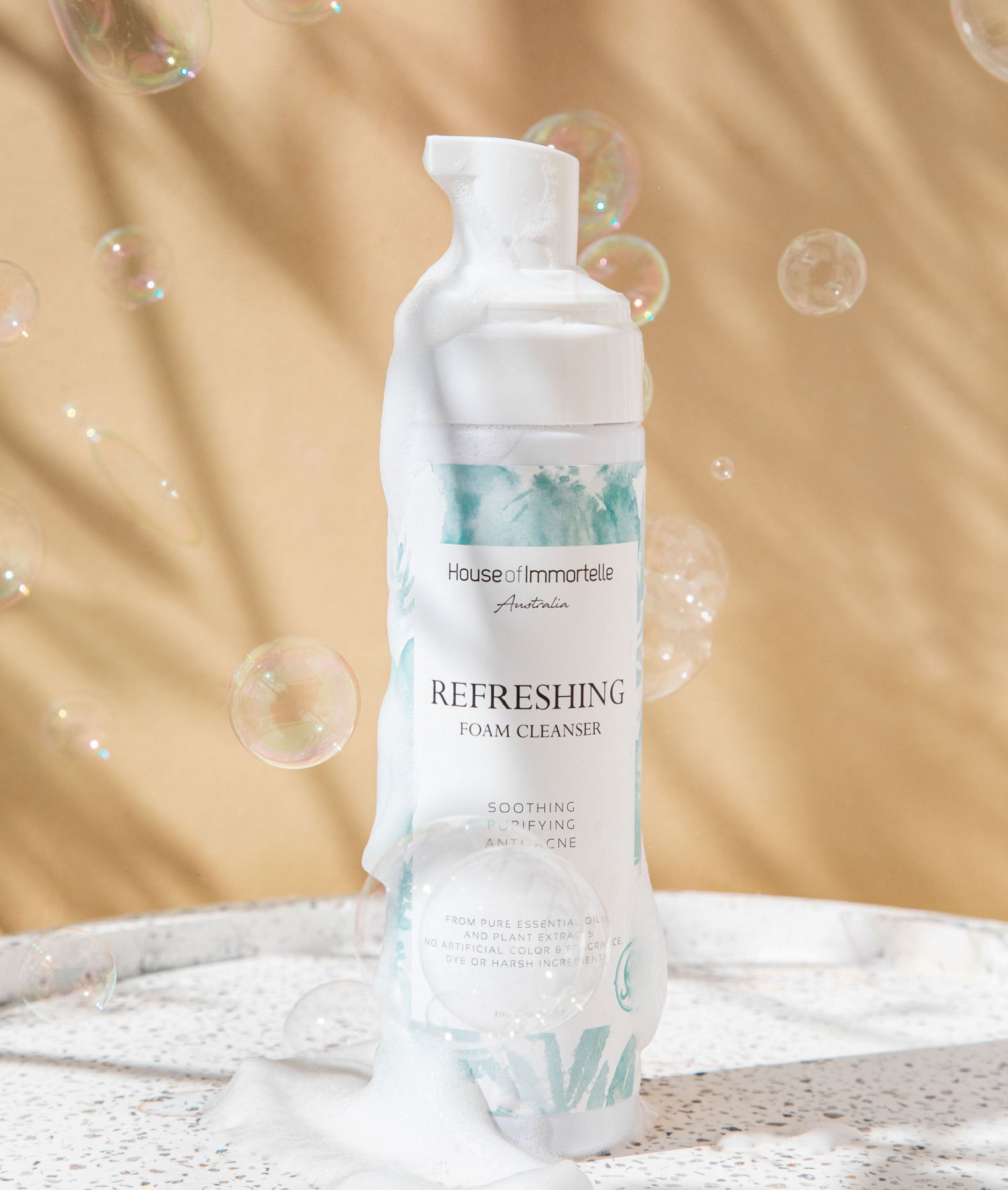Our skincare routines begin and end with a facial cleanser, but do you truly know its significance?
Facial cleansers are more than just a means of cleansing; they serve as the foundation of your skincare routine, creating a clean slate that balances your skin, eliminates impurities, and provides the ideal canvas for other products.
In a market filled with options like foaming, cream, and oil cleansers, selecting the right one can be daunting. This simplifies this decision by delving into the intricacies of different skin types, the unique properties of various cleanser formulations, and insights on aligning your skin type with the most suitable cleanser.
Understanding Your Skin Type
Before we explore the world of cleansers, it’s crucial to understand your skin type, as it significantly influences your decision in choosing a face cleanser. Skin types typically fall into categories such as normal, oily, dry, combination, and sensitive, each with its own unique characteristics and needs.
Normal Skin
Normal skin represents the equilibrium of skin health, maintaining a perfect balance between oil and moisture content. This skin type boasts a smooth texture and a clear, radiant appearance. It is the least problematic of all skin types, as it is not prone to severe sensitivities or blemishes.
Oily Skin
Excessive sebum production characterises oily skin, resulting in a shiny appearance, especially in the T-zone (forehead, nose, chin). Oily skin tends to be more susceptible to acne, blackheads, and enlarged pores due to overactive sebaceous glands. However, it tends to show signs of ageing at a slower rate compared to other skin types.
Dry Skin
Dry skin lacks adequate oil and moisture, leading to a tight and rough texture. It may appear dull and is more prone to flaking, redness, and scaling. Hydration and maintaining the skin’s natural barrier are essential for this skin type.
Combination Skin
Combination skin combines elements of both oily and dry skin. The T-zone tends to be oily, while the cheeks may be normal or dry. Balancing these opposing needs can be challenging.
Sensitive Skin
Sensitive skin is the most delicate skin type, often reacting to certain ingredients or environmental factors with irritation, redness, itching, or burning sensations. Gentle products that preserve the skin’s barrier function are crucial for sensitive skin.
How to Determine Your Skin Type
Identifying your skin type can be challenging, but you can follow these simple steps to help determine it:
- To begin, gently cleanse your face with a mild, neutral cleanser, effectively removing makeup, oil, and dirt. After cleansing, pat your skin dry without rubbing.
- Following cleansing, refrain from applying any skincare products and allow your skin to rest for approximately an hour. This period enables your skin to return to its natural state.
- Once your skin has reverted to its natural state, shift your focus to the T-zone, as it often provides the most telling clues. If this area becomes shiny quickly, it is indicative of oily or combination skin.
- Gently pinch your cheeks and take note of how they feel. If your cheeks feel tight or exhibit signs of flaking, your skin is likely dry.
- Pay close attention to any redness, itching, or discomfort you may experience during this observation period, as these symptoms could indicate sensitive skin.
The Differences Between Foaming, Cream, and Oil Cleanser
Skin types are not the only factors that exhibit vast differences; cleansers themselves can also vary significantly in their formulations and associated benefits.
Here’s a breakdown of these distinctions:
Foaming Cleansers
Foaming face cleansers are renowned for their ability to create a rich lather, effectively removing excess oil and impurities. They often contain surfactants that provide a deep cleansing effect. However, poorly formulated foaming cleansers can strip the skin of its natural oils, leading to dryness.
High-quality options like those available at House of Immortelle are designed to be gentle, featuring plant hydrosol-based formulas that provide a light, makeup-melting lather. Foaming cleansers are generally recommended for oily and combination skin types due to their proficiency in controlling excess sebum.
Cream Cleansers
Cream cleansers are characterised by their thick, creamy consistency. They are formulated to cleanse the skin gently while preserving its natural moisture balance. Infused with hydrating ingredients, they are ideal for dry and sensitive skin types. These gentle milky cleansers ensure that the skin is cleaned without removing its essential oils, providing hydration and soothing benefits.
Oil Cleansers
Oil face cleansers employ the principle of ‘like dissolves like’ to remove oil-based impurities, including makeup and sunscreen. Contrary to popular belief, they can suit all skin types, including oily skin, as they balance the skin’s natural oils rather than strip them away. Gently cleans oils excel at removing heavy, waterproof makeup while keeping the skin nourished.
A Deeper Comparison of Cleansers
When making comparisons between facial cleansers, it’s essential to take into account their effects on the skin’s pH, their efficiency in eliminating impurities, and their capacity to preserve the skin’s natural barrier.
Impact on Skin’s pH
The skin’s natural pH typically ranges from slightly acidic at about 4.7 to 5.75. This acidity forms a barrier, known as the acid mantle, which protects the skin from environmental stressors.
Foaming Cleansers
Refreshing Foaming Cleanser may contain ingredients that temporarily raise the skin’s pH to a more alkaline level. While they excel at deep cleaning, their high pH can disrupt the skin’s acid mantle, making it prone to irritation and dryness. Therefore, they might not be the best choice for those with sensitive or dry skin.
Cream Cleansers
Cream based face cleansers are typically formulated to be closer to the skin’s natural pH. Their gentler cleansing agents and added moisturisers help maintain the acid mantle, making them ideal for dry, sensitive, or mature skin types.
Oil Cleansers
Oil face cleansers are also pH-balanced and tend to be very gentle on the skin. They preserve the integrity of the acid mantle while effectively dissolving oil-based impurities, suitable for most skin types, including oily skin.
Efficacy in Removing Impurities
Foaming Cleansers
Their strong surfactants make them highly effective in removing dirt, excess oil, and makeup. However, they might be too harsh for certain skin types, potentially stripping away natural oils and leading to an overproduction of sebum in response.
Cream Face Cleansers
While cream based face cleansers excel at removing dirt and makeup gently, they might not be as effective as foaming cleansers in removing heavy makeup or deeply seated impurities. However, their hydrating properties make them excellent for maintaining the skin’s moisture balance.
Oil Cleansers
These cleansers are particularly effective at dissolving oil-based impurities, including waterproof makeup, sunscreen, and excess sebum. Their efficacy is based on the principle that oil dissolves oil, providing a deep clean without drying out the skin.
Maintaining the Skin’s Natural Barrier
The skin’s barrier function is crucial in preventing moisture loss and protecting against external irritants.
Foaming Cleansers
Due to their potential to strip the skin of its natural oils, foaming cleansers might weaken the skin’s barrier, especially if used excessively or if they contain harsh detergents. Therefore, choosing options that specify their gentle nature and use gentle ingredients is very important.
Cream Cleansers
They are often formulated with ingredients that support the skin’s barrier function, such as ceramides, fatty acids, and cholesterol. This makes them a nurturing choice for maintaining the health of the skin barrier.
Oil Cleansers
Gentle cleansing oils help preserve the lipid layer of the skin, especially beneficial in dry or cold climates where the skin might be prone to dehydration.
Final Thoughts
When learning how to cleanse your face effectively, the journey to finding the perfect facial cleanser becomes highly personal, hinging on your understanding of your skin type and its unique requirements. By considering the distinctive properties and benefits of foaming, cream, and oil cleansers, you can make an informed choice that not only cleanses effectively but also contributes positively to your overall skin health. Keep in mind that skincare is an ever-evolving process, and at times, it may require some experimentation to find the perfect fit.
House of Immortelle captures and utilises the age-defying skin healing and mind soothing properties of active Australian botanicals. The majority of skincare products include water as the main ingredient leaving very little room for active, working ingredients. This is where the House of Immortelle skincare differs. Our ranges utilise plant hydrosols as a base ingredient making our products more effective on the skin as they have a natural synergy with other natural, active ingredients we use in the formulation.
Available online via https://www.houseofimmortelle.com.au
“This is an Advertisement Feature”

















